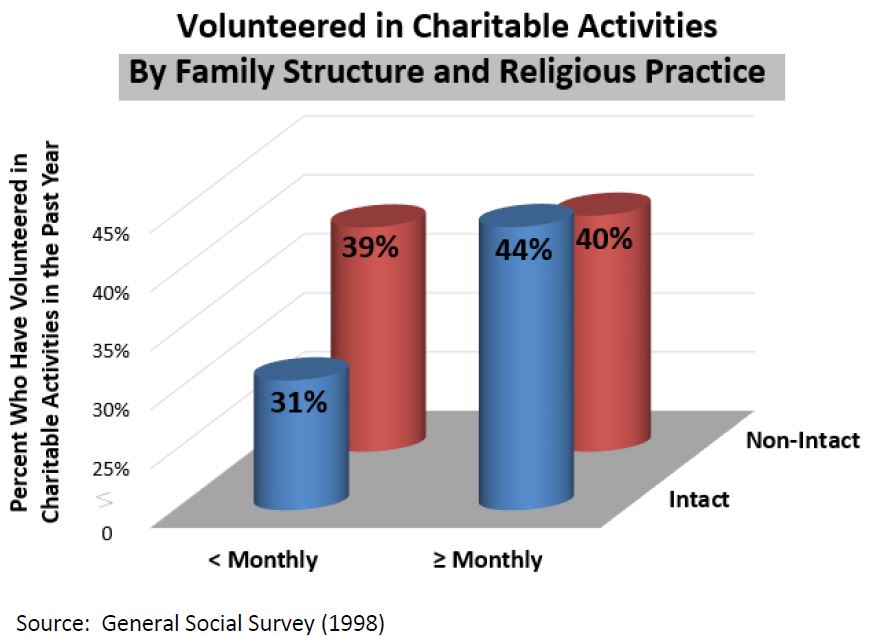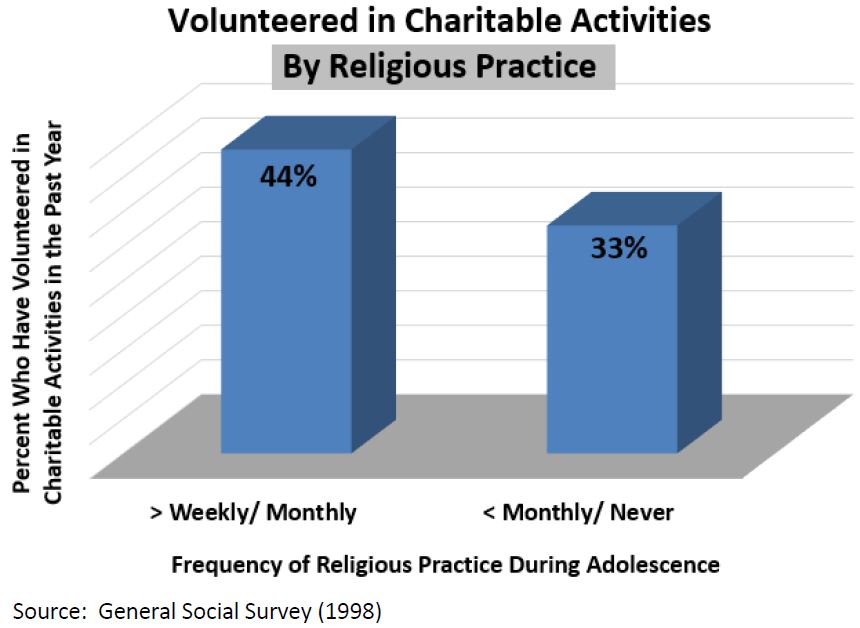Click Here to download “Volunteered in Charitable Activities by Family Structure and Religious Practice”
Volunteered in Charitable Activities by Family Structure and Religious Practice
Religious Practice: According to the 1998 General Social Survey, 44 percent of adults who attended religious services at least monthly as adolescents had volunteered in a charitable activity in the last year, compared to 33 percent of adults who attended worship less than monthly as adolescents.
 Family Structure:
Family Structure: Adolescent family structure background makes little statistical difference in levels of adult volunteering for charitable activities. According to the General Social Survey, 39 percent of people from both intact and non-intact families volunteered in charitable activities in the past year.
 Family Structure and Religious Practice Combined:
Family Structure and Religious Practice Combined: Based on the General Social Survey 44 percent of adults who attended religious services at least monthly and lived in an intact family as adolescents had volunteered in a charitable activity in the last year, compared to 31 percent of adults who attended religious services less than monthly and lived in an intact family as adolescents. In between were those who lived in a non-intact family and attended religious services less than monthly (39 percent) and those who had attended religious services at least monthly but lived in a non-intact family (40 percent). As the findings show, family structure during adolescence has no effect on adult volunteerism, but when combined with adolescent religious attendance, large differences emerge in the patterns of volunteering in charitable activities as adults.
 Related Insights from Other Studies:
Related Insights from Other Studies: To the best of our knowledge, no other studies have correlated adolescent religious attendance and family structure with adult volunteerism in charitable activities, but some studies have correlated adolescent religious attendance and family structure with contemporaneous volunteerism.
Daniel Lichter of the Ohio State University and colleagues found that “religious attendance increases the likelihood of volunteerism” for males and females in late adolescence and that single-parent families “are negatively associated with later prosocial behaviors,” especially for boys.
[1]
Judith Smetana and Aaron Metzger of the University of Rochester also reported that “middle class African American adolescents’ spirituality and religiosity had a significant influence on their civic involvement” and that their intended involvement in future civic activities was predicted by positive communication with their mothers and fathers.
[2]
As the evidence indicates, adolescents who frequently attend religious services and live in intact families are most likely to volunteer in charitable activities, both now and in the future, while their less religious counterparts are least likely.
[1] Daniel T. Lichter, et al., “Helping Others?: The Effects of Childhood Poverty and Family Instability on Prosocial Behavior,”
Youth Society, vol. 34 (2002): 89-119.
[2] Judith G. Smetana and Aaron Metzger, “Family and Religious Antecedents of Civic Involvement in Middle Class African American Late Adolescents,”
Journal of Research on Adolescence, vol. 15 (2005): 325-352.
]]>
 Family Structure: Adolescent family structure background makes little statistical difference in levels of adult volunteering for charitable activities. According to the General Social Survey, 39 percent of people from both intact and non-intact families volunteered in charitable activities in the past year.
Family Structure: Adolescent family structure background makes little statistical difference in levels of adult volunteering for charitable activities. According to the General Social Survey, 39 percent of people from both intact and non-intact families volunteered in charitable activities in the past year.
 Family Structure and Religious Practice Combined: Based on the General Social Survey 44 percent of adults who attended religious services at least monthly and lived in an intact family as adolescents had volunteered in a charitable activity in the last year, compared to 31 percent of adults who attended religious services less than monthly and lived in an intact family as adolescents. In between were those who lived in a non-intact family and attended religious services less than monthly (39 percent) and those who had attended religious services at least monthly but lived in a non-intact family (40 percent). As the findings show, family structure during adolescence has no effect on adult volunteerism, but when combined with adolescent religious attendance, large differences emerge in the patterns of volunteering in charitable activities as adults.
Family Structure and Religious Practice Combined: Based on the General Social Survey 44 percent of adults who attended religious services at least monthly and lived in an intact family as adolescents had volunteered in a charitable activity in the last year, compared to 31 percent of adults who attended religious services less than monthly and lived in an intact family as adolescents. In between were those who lived in a non-intact family and attended religious services less than monthly (39 percent) and those who had attended religious services at least monthly but lived in a non-intact family (40 percent). As the findings show, family structure during adolescence has no effect on adult volunteerism, but when combined with adolescent religious attendance, large differences emerge in the patterns of volunteering in charitable activities as adults.
 Related Insights from Other Studies: To the best of our knowledge, no other studies have correlated adolescent religious attendance and family structure with adult volunteerism in charitable activities, but some studies have correlated adolescent religious attendance and family structure with contemporaneous volunteerism.
Daniel Lichter of the Ohio State University and colleagues found that “religious attendance increases the likelihood of volunteerism” for males and females in late adolescence and that single-parent families “are negatively associated with later prosocial behaviors,” especially for boys.[1]
Judith Smetana and Aaron Metzger of the University of Rochester also reported that “middle class African American adolescents’ spirituality and religiosity had a significant influence on their civic involvement” and that their intended involvement in future civic activities was predicted by positive communication with their mothers and fathers.[2]
As the evidence indicates, adolescents who frequently attend religious services and live in intact families are most likely to volunteer in charitable activities, both now and in the future, while their less religious counterparts are least likely.
[1] Daniel T. Lichter, et al., “Helping Others?: The Effects of Childhood Poverty and Family Instability on Prosocial Behavior,” Youth Society, vol. 34 (2002): 89-119.
[2] Judith G. Smetana and Aaron Metzger, “Family and Religious Antecedents of Civic Involvement in Middle Class African American Late Adolescents,” Journal of Research on Adolescence, vol. 15 (2005): 325-352.
]]>
Related Insights from Other Studies: To the best of our knowledge, no other studies have correlated adolescent religious attendance and family structure with adult volunteerism in charitable activities, but some studies have correlated adolescent religious attendance and family structure with contemporaneous volunteerism.
Daniel Lichter of the Ohio State University and colleagues found that “religious attendance increases the likelihood of volunteerism” for males and females in late adolescence and that single-parent families “are negatively associated with later prosocial behaviors,” especially for boys.[1]
Judith Smetana and Aaron Metzger of the University of Rochester also reported that “middle class African American adolescents’ spirituality and religiosity had a significant influence on their civic involvement” and that their intended involvement in future civic activities was predicted by positive communication with their mothers and fathers.[2]
As the evidence indicates, adolescents who frequently attend religious services and live in intact families are most likely to volunteer in charitable activities, both now and in the future, while their less religious counterparts are least likely.
[1] Daniel T. Lichter, et al., “Helping Others?: The Effects of Childhood Poverty and Family Instability on Prosocial Behavior,” Youth Society, vol. 34 (2002): 89-119.
[2] Judith G. Smetana and Aaron Metzger, “Family and Religious Antecedents of Civic Involvement in Middle Class African American Late Adolescents,” Journal of Research on Adolescence, vol. 15 (2005): 325-352.
]]>
